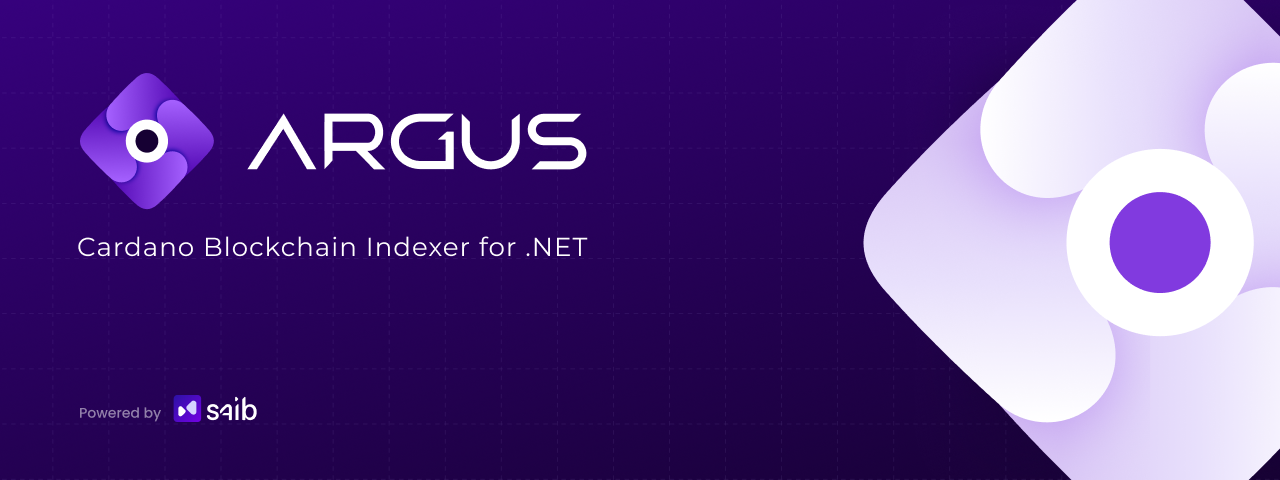
What is Argus?
Argus is a .NET library that simplifies interactions with the Cardano blockchain by providing an efficient indexing framework. It processes block data into structured, queryable formats stored in a database, making blockchain data easier to work with for .NET developers.
For a detailed explanation and demo of Argus, check out this video walkthrough!
Key Components
Argus is built around several core components that work together to provide a complete indexing solution:
- Blockchain Indexing - Transform raw blockchain data into structured database records
- Reducers - Define the transformation logic for blockchain data
- Chain Providers - Connect to Cardano nodes through various protocols
- CardanoIndexWorker - Coordinates the synchronization process
- CardanoDbContext - Manages database operations via Entity Framework Core
Features
- Customizable Reducers - Define exactly how blockchain data should be processed and stored
- Flexible Connectivity Options - Connect to Cardano in the way that suits you best
- Robust Rollback Handling - Ensure data consistency when blockchain reorganizations occur
- Comprehensive Monitoring - Track indexing progress with built-in dashboard
- Developer-Friendly Integration - Built for .NET developers with full Entity Framework Core support
How Argus Works
Argus follows a straightforward yet powerful pattern to process blockchain data:
- Connect to a Cardano node using one of the available providers
- Sync with the blockchain to receive blocks in real-time
- Process blocks through your custom reducers to extract and transform data
- Store the processed data in your database for easy querying
- Handle chain reorganizations automatically to maintain data consistency
The heart of Argus is the reducer pattern, which gives you full control over data processing:
public class BlockReducer : IReducer<BlockInfo>
{
public async Task RollForwardAsync(Block block)
{
// Extract data from the block
string hash = block.Header().Hash();
ulong slot = block.Header().HeaderBody().Slot();
// Store it in your database
using var db = dbContextFactory.CreateDbContext();
db.Blocks.Add(new BlockInfo(hash, slot, DateTime.UtcNow));
await db.SaveChangesAsync();
}
public async Task RollBackwardAsync(ulong slot)
{
// Handle rollbacks when chain reorganizations occur
using var db = dbContextFactory.CreateDbContext();
db.Blocks.RemoveRange(db.Blocks.Where(b => b.Slot >= slot));
await db.SaveChangesAsync();
}
}
Architecture
Argus consists of several specialized components working together:
| Component | Description |
|---|---|
| Chain Providers | Connect to the Cardano blockchain through various protocols |
| Reducers | Process and transform blockchain data |
| CardanoIndexWorker | Manages the synchronization process |
| CardanoDbContext | Base context for database operations |
Chain Providers
Chain providers are the connection layer between Argus and the Cardano blockchain. They abstract the underlying communication protocols:
- N2CProvider (UnixSocket): Implements Ouroboros mini-protocols directly over Unix sockets for local node connections
- U5CProvider (gRPC): Uses UtxoRPC to connect to remote Cardano nodes via gRPC, ideal for cloud deployments
- N2NProvider (TCP): Implements Ouroboros mini-protocols over TCP/IP connections
The modular design allows for new providers to be added when new connection methods become available. Custom providers can be implemented by extending the ICardanoChainProvider interface, making Argus adaptable to future Cardano network developments.
Performance
Performance is critical for blockchain applications that need to process large volumes of data efficiently. Argus has been engineered with performance as a central design principle:
Processing Efficiency
Argus achieves high-performance blockchain data processing through:
- Optimized Data Pipeline - Streamlined flow from blockchain to database
- Connection Pooling - Efficient database connection management
- Strategic Parallelization - Parallel processing where it provides the most benefit
- Memory-Efficient Handling - Careful management of resources during processing
Database Integration
By leveraging Entity Framework Core, Argus provides powerful data access capabilities:
- Efficient Querying - LINQ expressions compiled to optimized SQL
- Relationship Management - Eager, lazy, and explicit loading of related data
- Advanced Data Operations - Support for complex filtering, sorting, and pagination
- Projections and Aggregations - Retrieve exactly the data you need in the format you need it
What Can You Build with Argus?
Argus serves as a foundation for building a wide range of blockchain applications. Here are some of the key use cases that Argus is particularly well-suited for:
Financial Applications
-
DeFi Analytics Platforms
Monitor liquidity pools, track yield farming opportunities, and analyze trading volumes across Cardano DeFi protocols -
Trading Intelligence Tools
Provide real-time insights into market movements, token valuations, and transaction patterns
Digital Asset Management
-
NFT Marketplaces & Galleries
Track ownership history, monitor floor prices, and identify trading patterns across collections -
Asset Portfolio Trackers
Create comprehensive views of digital asset holdings with historical performance metrics
Blockchain Infrastructure
-
Smart Contract Monitoring
Track specific contract executions, monitor protocol health, and detect anomalies in transaction patterns -
Wallet Analytics Services
Provide insights into wallet activity, transaction history, and asset movements
Enterprise Solutions
-
Supply Chain Traceability
Track asset movements with verified blockchain records for supply chain transparency -
Custom Analytics Platforms
Build specialized data pipelines for particular business needs with Cardano blockchain data
